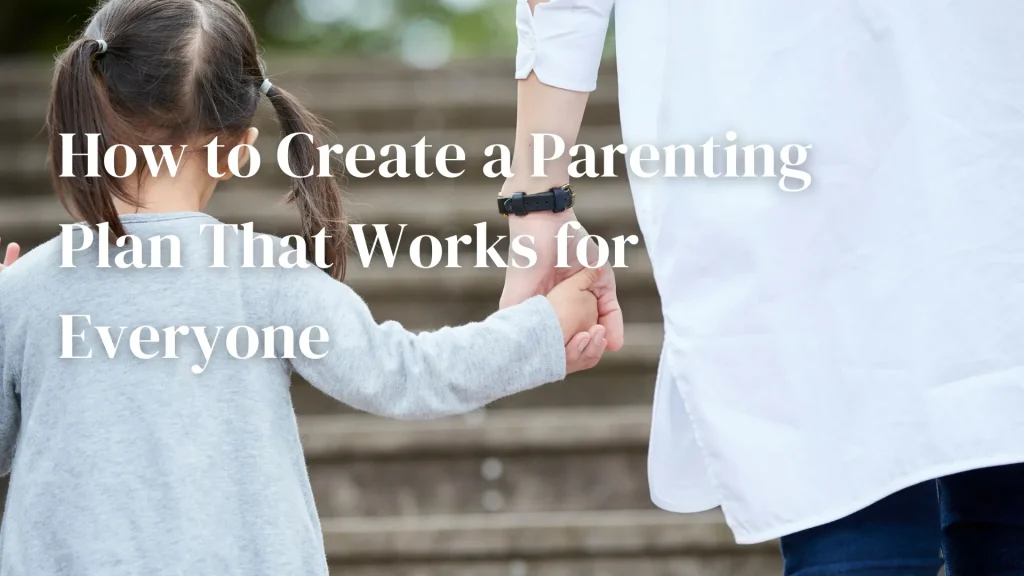 One of the most challenging aspects of a divorce or separation is establishing a parenting plan that works for everyone. While your child’s best interests should always be the top priority, you’ll also need a plan that offers flexibility, accountability, and opportunities for both parents to contribute to the health and happiness of their child. Well-structured parenting plans after divorce can help create stability, reduce conflict, and ensure both parents remain actively involved in their child’s life.
One of the most challenging aspects of a divorce or separation is establishing a parenting plan that works for everyone. While your child’s best interests should always be the top priority, you’ll also need a plan that offers flexibility, accountability, and opportunities for both parents to contribute to the health and happiness of their child. Well-structured parenting plans after divorce can help create stability, reduce conflict, and ensure both parents remain actively involved in their child’s life.
While it may seem like an overwhelming task, there are things you can do to help create a parenting plan that works for everyone and addresses everyone’s needs and concerns. Creating a co-parenting plan after a separation involves open communication, flexibility, and focusing on what’s best for your child as both parents adjust to a new family dynamic.
What Is a Parenting Plan?
A parenting plan is a written agreement that outlines how divorced, separated, or unmarried parents will raise their child or children together after they split. It ensures that the child’s best interests are prioritized and that both parents have clear guidelines for co-parenting regarding parenting time, living arrangements, and decision-making responsibilities. When one parent needs to move, a well-structured relocation and custody agreement becomes essential to address how the move will affect parenting time and maintain stability for the child.
Types of Custody in Parenting Plans
Numerous custody arrangements are included in New Jersey parenting plans, so parents should understand the common terminology used in child custody cases. “Child custody” is a blanket phrase that can refer to any number of unique parenting plans and agreements. Physical and legal custody are two distinct arrangements of child custody that parents should familiarize themselves with before establishing a parenting plan.
Physical custody arrangements refer to a child’s living situation or the parent with whom the child lives most of the time. Joint custody agreements give each parent relatively equal time with the child. Sole physical custody means the child primarily lives with one parent, and the other may have visitation.
Legal custody is the right to decision-making responsibilities. In a joint legal custody situation, both parents make decisions for a child regarding their education, medical care, and upbringing. Sole legal custody means only one parent can make crucial decisions for a child.
Legal Considerations and Court Approval
Sometimes parents can effectively work together to solve their parenting plan issues, either by themselves or through an alternative dispute resolution process like mediation. In other instances, parents may need the court to intervene to help them arrive at a workable parenting plan that addresses the child’s best interests.
When parents cannot find a parenting plan that works for them, the court considers:
- Parents’ ability to agree, communicate, and cooperate on behalf of their child
- Parents’ willingness to accept the custody outcome and foster a good relationship with the other parent
- The needs of the child
- Stability of each parent’s home environment
- Quality and continuity of the child’s education
- Fitness of each parent
- Proximity of each parent to the other
- The quality of time each parent spent with the child before separation
- Each parent’s employment responsibilities
- Number and age of additional children
- Reasonable preferences of the child
- Any history of domestic violence or abuse
No matter the situation, the court must approve parenting plans. When parents agree on the terms of their parenting plan, they can present it to a New Jersey court for approval. When parents disagree and require the court to intervene, the court considers the factors above and arrives at a parenting plan that aligns with the child’s best interests. After court approval, parents must stick to the terms of their child-focused parenting plan or risk legal penalties.
Please read more about exploring a co-parenting plan here: Two Homes, One Childhood: Exploring Co-parenting with an Ex.
Creating a Parenting Plan That Works for Everyone

The best parenting plans work for everyone involved. However, your child’s physical and mental wellness should be the top priority. Creating a plan that addresses everyone’s needs and goals can be challenging, especially during an emotional time like a divorce. You and your family can find an effective parenting plan with some work and careful planning. Start by considering the following:
- Prioritize your child’s needs
- Be honest about your schedule and capabilities
- Focus on communicating with your partner
- Clearly define custody and parenting time plans
- Outline all decision-making responsibilities
- Anticipate exceptional circumstances and be flexible
- Include a process for resolving conflicts or disputes
- Utilize organizational and communication tools
- Everything should be in writing and legally approved by a New Jersey court
Divorce and separation can be a time of conflict. The goal of finding a parenting plan that works for everyone is cooperation, not competition.
A New Jersey Child Custody Lawyer Can Offer Help and Support
At Law Office of Andrew A. Bestafka, Esq., our experienced child custody lawyers in New Jersey can help you and your family find parenting solutions that work for you and put your child front and center. It can be stressful working with an ex-spouse on developing a parenting plan. Let our legal team offer you the guidance and support you need to achieve the most favorable outcome possible.
Contact our office today or call us at (732) 898-2378 to arrange a confidential case review.
